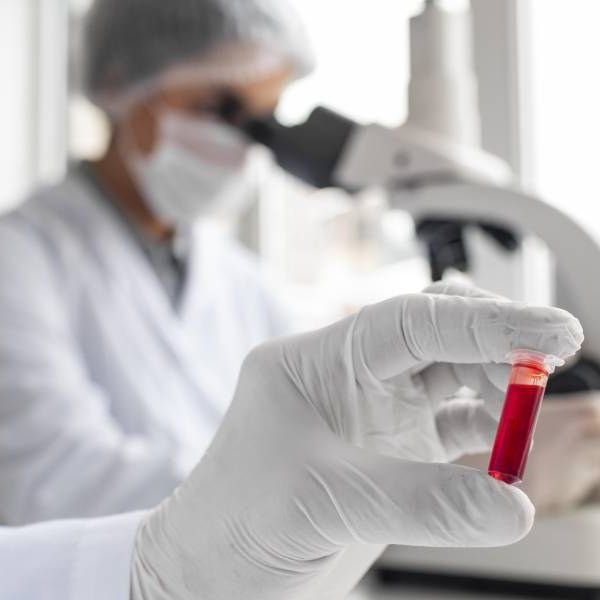Top Blood Banking technology colleges in Bangalore
Table of Contents
ToggleWhat is Blood Banking technology?
Blood banking technology has revolutionized the way blood transfusion services operate, making it safer and more efficient for both donors and recipients.
Over the years, blood banking has come a long way from simple blood storage to an intricate system of collection, testing, processing, and distribution.
This article delves into the latest innovations in blood banking technology, highlighting their benefits and potential applications.
Admission in Top Blood Banking technology colleges in Bangalore
Automation and Robotics
Automated systems and robotics have made significant strides in blood banking technology. Automation has streamlined the processing of blood products, reducing the risk of human error and contamination. Robotic arms, for instance, are used in blood processing and testing to ensure accuracy and precision. These innovations have significantly improved the speed and efficiency of blood banking procedures.
Pathogen Reduction Technology (PRT)
Pathogen reduction technology is a cutting-edge advancement designed to enhance blood safety by inactivating or eliminating potential pathogens from blood products. This innovative technique uses chemicals, ultraviolet light, or other methods to eliminate pathogens like viruses, bacteria, and parasites without affecting the functionality of blood components. PRT has proven crucial in minimizing the risk of transfusion-transmitted infections and ensuring safer blood products for recipients.
Molecular Blood Typing
Molecular blood typing has become an essential tool for identifying blood groups with greater accuracy than traditional serology-based methods. This technology involves analyzing an individual’s DNA to determine their blood group antigens more accurately. Molecular blood typing has increased the compatibility of blood transfusions, reduced adverse reactions, and facilitated the identification of rare blood types.
Point-of-Care Testing (POCT)
Point-of-care testing enables rapid blood testing at the site of patient care, reducing the time taken to obtain results and make clinical decisions. Portable devices like handheld analyzers can quickly determine blood type and compatibility, perform blood counts, and assess coagulation parameters. POCT helps expedite decision-making in emergency situations and reduces the likelihood of transfusion-related complications.
Cryopreservation and 3D Bioprinting
Cryopreservation technology has revolutionized the storage of blood products, enabling the preservation of blood cells and plasma for extended periods without compromising their quality. This advancement is particularly beneficial for rare blood types, ensuring their availability when needed.
Additionally, 3D bioprinting has emerged as a promising technology in blood banking, with the potential to create artificial blood vessels and even blood cells. While still in its early stages, 3D bioprinting could eventually reduce the reliance on blood donations and revolutionize transfusion medicine.
Top Blood Banking Technology colleges in Bangalore
Bangalore, the Silicon Valley of India, is home to several prestigious institutions offering a diverse range of educational programs. Among these, blood banking technology has emerged as a sought-after discipline, with numerous colleges providing top-notch education in this field. In this article, we will explore some of the top blood banking technology colleges in Bangalore that are helping students excel in their careers.
St. John’s Medical College
St. John’s Medical College is a renowned institution in Bangalore, offering an array of medical courses. It’s Department of Transfusion Medicine and Blood Banking provides comprehensive education and training in blood banking technology, focusing on the collection, storage, processing, and distribution of blood products. The college boasts state-of-the-art facilities, dedicated faculty, and a strong research-oriented approach, making it a top choice for aspiring blood banking professionals.
Bangalore Medical College and Research Institute (BMCRI)
BMCRI, one of the oldest and most prestigious medical colleges in Bangalore, has a dedicated Department of Transfusion Medicine that offers specialized education in blood banking technology. The college’s curriculum emphasizes hands-on training, research opportunities, and exposure to the latest advancements in blood banking. BMCRI’s cutting-edge infrastructure and experienced faculty make it a prime choice for students pursuing a career in blood banking technology.
Ramaiah Medical College
Ramaiah Medical College, a leading institution in Bangalore, offers a robust Transfusion Medicine program, equipping students with the skills and knowledge required to excel in blood banking technology. The college’s curriculum covers critical aspects of blood banking, including blood collection, testing, processing, and distribution. Ramaiah Medical College’s well-equipped laboratories, experienced faculty, and focus on research and innovation make it an excellent choice for students interested in this field.
Vydehi Institute of Medical Sciences and Research Centre
The Vydehi Institute of Medical Sciences and Research Centre, a prominent institution in Bangalore, provides comprehensive education in blood banking technology through its Department of Transfusion Medicine. The college emphasizes practical training and exposure to the latest innovations in the field, ensuring that students receive a well-rounded education. With state-of-the-art facilities and a dedicated faculty, the Vydehi Institute is an ideal choice for students pursuing a career in blood banking technology.
Kempegowda Institute of Medical Sciences (KIMS)
KIMS, a renowned medical college in Bangalore, offers an excellent Transfusion Medicine program through its Department of Blood Banking. The college’s curriculum focuses on the theoretical and practical aspects of blood banking technology, ensuring that students gain the skills required for a successful career in the field. KIMS boasts modern infrastructure, experienced faculty, and a strong emphasis on research, making it an attractive option for students interested in blood banking technology.
What students study in Blood Banking technology?
Blood banking technology is a specialized field within transfusion medicine that focuses on the collection, testing, processing, storage, and distribution of blood and blood products. As the demand for skilled professionals in this field grows, more educational institutions are offering comprehensive programs to prepare students for a successful career in blood banking technology. In this article, we will delve into the key subjects and areas of study within the blood banking technology curriculum.
Blood Collection and Processing
A crucial aspect of blood banking technology is understanding the proper methods for blood collection and processing. Students learn the different techniques used to collect blood, including venepuncture and apheresis. Additionally, they study the procedures involved in separating blood components, such as red blood cells, white blood cells, platelets, and plasma, as well as the steps required to process and store these components safely.
Blood Group Serology and Molecular Blood Typing
Blood group serology and molecular blood typing are essential subjects in the blood banking technology curriculum. Students learn about the various blood group systems, including the ABO and Rh systems, as well as the antigens and antibodies associated with each group. They also study advanced molecular techniques used to determine blood types more accurately, which helps ensure compatibility during blood transfusions.
Immunohematology
Immunohematology is the study of the immune system’s interaction with blood components. Blood banking technology students learn about the role of antigens, antibodies, and other immune system components in transfusion medicine. This subject is vital for understanding transfusion reactions, hemolytic disease of the fetus and newborn (HDFN), and other blood-related conditions.
Pathogen Reduction and Blood Safety
Ensuring the safety of blood products is paramount in transfusion medicine. Students learn about the various methods used to inactivate or eliminate pathogens from blood products, including chemical treatments, ultraviolet light, and filtration techniques. They also study the importance of strict screening and testing procedures to minimize the risk of transfusion-transmitted infections.
Transfusion Therapy and Clinical Applications
Students study the principles of transfusion therapy and the clinical applications of blood products in treating various medical conditions. They learn about the indications, contraindications, and potential complications associated with blood transfusions. This subject also covers the management of transfusion reactions and the appropriate use of blood products in specific clinical scenarios, such as trauma, surgery, and hematology/oncology patients.
Quality Management and Regulations
Blood banking technology students must understand the importance of quality management and regulatory compliance within the field. They learn about the standards and guidelines established by organizations such as the American Association of Blood Banks (AABB), the Food and Drug Administration (FDA), and other regulatory bodies. This subject covers topics such as quality control, quality assurance, and the development and implementation of standard operating procedures (SOPs).
Practical Training and Internships
Hands-on training is a critical component of the blood banking technology curriculum. Students participate in practical training sessions and internships at blood banks, hospitals, or other healthcare facilities, where they gain valuable experience in various aspects of blood banking technology, such as blood collection, processing, testing, and transfusion procedures.
Scope after Studying Blood Banking technology
Blood banking technology plays a crucial role in the healthcare industry, ensuring the safe collection, processing, storage, and distribution of blood and blood products. As the field continues to evolve, professionals with specialized training in blood banking technology are in high demand. In this article, we will explore the scope and potential career opportunities for individuals who have studied blood banking technology.
Blood Bank Technologist
One of the primary career paths for individuals who have studied blood banking technology is to become a blood bank technologist. These professionals work in blood banks, hospitals, and other healthcare facilities, performing tasks such as blood collection, component separation, testing for blood type compatibility, and ensuring the safety of blood products. Blood bank technologists are vital in maintaining the integrity of the blood supply and facilitating life-saving transfusions.
Transfusion Medicine Specialist
Transfusion medicine specialists are medical professionals who have completed advanced training in blood banking technology and transfusion medicine. They are responsible for overseeing the safe administration of blood products to patients, managing transfusion reactions, and consulting on complex cases involving transfusion therapy. Transfusion medicine specialists often work in hospitals, blood banks, and reference laboratories.
Quality Assurance and Regulatory Affairs
Individuals with a background in blood banking technology can also pursue careers in quality assurance and regulatory affairs. These professionals are responsible for ensuring compliance with established guidelines and regulations, maintaining the quality of blood products, and developing standard operating procedures (SOPs) for blood banks and transfusion services. They often collaborate with organizations such as the American Association of Blood Banks (AABB), the Food and Drug Administration (FDA), and other regulatory bodies.
Blood Donor Recruitment and Public Relations
Blood donor recruitment and public relations are essential aspects of blood banking. Professionals in this field develop strategies to encourage blood donation and educate the public about the importance of blood donation. They may organize blood drives, create awareness campaigns, and work closely with community organizations to increase blood donor participation. This career path is ideal for individuals with strong communication skills and a passion for promoting blood donation.
Research and Development
As blood banking technology continues to evolve, research and development play a significant role in driving innovation within the field. Individuals with a background in blood banking technology can pursue careers in research, focusing on areas such as pathogen reduction, blood preservation, and the development of new blood products or testing methods. These professionals often work in academic institutions, research laboratories, or the research divisions of blood banks and transfusion services.
Education and Training
Another career path for individuals with a background in blood banking technology is education and training. These professionals can become educators, teaching future generations of blood banking technologists and other healthcare professionals about the intricacies of blood banking and transfusion medicine. They may work in colleges, universities, or specialized training centers, sharing their knowledge and expertise with aspiring professionals.
Placement opportunities after Studying Blood Banking technology
With advancements in medical science and an increasing demand for blood and blood products, blood banking technology has become a vital component of the healthcare industry. Professionals with specialized training in this field are essential in ensuring the safe and efficient handling of blood products. In this article, we will explore the various placement opportunities available for individuals who have studied blood banking technology.
Hospitals and Medical Centers
Hospitals and medical centers represent one of the primary placement opportunities for blood banking technology professionals. They often have on-site blood banks or transfusion services, requiring skilled blood bank technologists and transfusion medicine specialists. In this setting, professionals are responsible for blood collection, processing, compatibility testing, and transfusion support for patients undergoing surgery, trauma care, or treatment for various medical conditions.
Independent Blood Banks
Independent blood banks, which focus solely on blood collection, processing, and distribution, are another key placement opportunity for individuals with a background in blood banking technology. These facilities require professionals to manage blood donor recruitment, perform blood typing and compatibility testing, and ensure the safety and quality of blood products. Blood bank technologists, quality assurance specialists, and donor recruitment coordinators are examples of roles within this setting.
Reference Laboratories
Reference laboratories are specialized facilities that provide advanced testing and consultation services for healthcare providers. Blood banking technology professionals can find placement opportunities in these labs, performing specialized tests for blood group antigens, antibodies, and compatibility. They may also be involved in research and development, working on new testing methods and technologies to improve blood banking procedures.
Pharmaceutical and Biotechnology Companies
Pharmaceutical and biotechnology companies offer unique placement opportunities for individuals with a background in blood banking technology. These companies may develop new blood products, therapies, or testing methods, requiring professionals with specialized knowledge in blood banking and transfusion medicine. Roles within these organizations may include research and development, quality assurance, or regulatory affairs.
Government and Non-Profit Organizations
Government and non-profit organizations involved in blood banking and transfusion medicine also offer placement opportunities for blood banking technology professionals. These organizations may be responsible for overseeing blood donation programs, setting industry standards and guidelines, or providing support for blood banks and transfusion services. Professionals with a background in blood banking technology may find roles in policy development, program management, or quality assurance within these organizations.
Academic Institutions
Individuals with a background in blood banking technology can pursue placement opportunities in academic institutions, teaching future generations of blood banking professionals. Educators in this field may be responsible for developing and delivering curriculum, conducting research, and mentoring students. They may find roles in colleges, universities, or specialized training centers focused on blood banking and transfusion medicine.
Placement Oppurtunities
Placement opportunities after studying blood banking technology are diverse and abundant. Blood banking professionals can find rewarding careers in hospitals and medical centers, independent blood banks, reference laboratories, pharmaceutical and biotechnology companies, government and non-profit organizations, and academic institutions. With a strong foundation in blood banking technology, individuals can make significant contributions to the healthcare industry, ensuring the safety and availability of blood products for patients in need.





